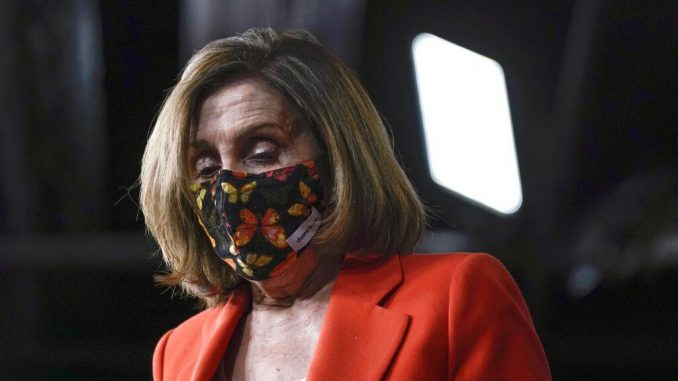

House Speaker Nancy Pelosi of Calif., walks onstage during a news conference before participating in the House Democratic Issues Conference on Capitol Hill in Washington, Tuesday, March 2, 2021. (AP Photo/Patrick Semansky)
OAN Newsroom
UPDATED 9:56 AM PT – Wednesday, March 3, 2021
Congress appears to be passing up an opportunity to address the issue of dark money in politics following past bipartisan attempts.
This comes as tensions appear to be growing on Capitol Hill over sweeping election reform proposed by House Democrats, which is something they said they would do last fall.
“We’re going to have H.R.1 right off the bat,” stated House Speaker Nancy Pelosi. “This is about cleaner government, so we can reduce the role of big, dark special interest money.”
@SpeakerPelosi has said that House Democrats in the next Congress are going to pass H.R. 1 “right off the bat.” This is great news for our democracy. We have to tackle the voter suppression, gerrymandering and dark money that have corrupted our nation for too long. pic.twitter.com/ajgXCMMqPt
— Senator Jeff Merkley (@SenJeffMerkley) October 31, 2020
Lawmakers are mostly sparring over provisions that would federalize the election process among other related items.
“The bill would allow the sitting president to effectively appoint a majority at the FEC in his party,” explained David Keating, President of the Institute for Free Speech.
However, the debate is taking attention away from a problem both Democrats and Republicans have previously flagged: dark money.
Part of Democrats’ pitch in favor of election bill H.R.1 notes it shines a light on dark money in politics by enforcing transparency. They said it would boost online political ad disclosure and require organizations to disclose their large donors, but Republicans argue the proposal would push lawmakers to profit off elections.
“Members of Congress are able to funnel campaign contributions into their personal bank accounts by simply hiring their spouses as campaign consultants,” stated Rep. Tom Tiffany (R-Wis.). “In fact, one high profile member of the body — this body — exploited this loophole top the tune of $2.8 million in the last election cycle.”
By attaching unrelated items to the legislation, Democrats appear to be killing any chance of bipartisan reform when it comes to election spending. Republican lawmakers and other conservatives said they are doing so at the expense of the First Amendment.
“There’s about half of the bill that would restrict speech about campaigns, would restrict speech about members of Congress, would restrict speech about legislation coming up with in Congress,” Keating explained. “It would also get rid of the internet exception where organizations are allowed to speak to the public using websites like YouTube or social media.”
H.R. 1 allows political campaigns to be funded by federal money, undermines state voter ID laws, and enables ballot harvesting. This is a bad bill, and I oppose it. pic.twitter.com/Nku5ZuphyY
— Rep Andy Biggs (@RepAndyBiggsAZ) March 2, 2021
Free speech advocates like Keating have warned that advocacy groups ranging from the Chamber of Commerce to the Sierra Club to pro-gun groups will likely be impacted. It would make their work more difficult. Opponents of H.R.1 are urging Congress against passing the legislation and, instead, consider reworking it to uphold free speech.





Be the first to comment